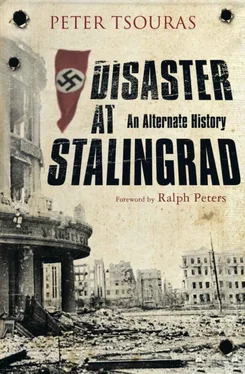Earlier in the war, Graf Spee and Bismarck had savaged enemy shipping only to be hunted down and sunk. Now that Hitler had got himself stuck in a war with the Soviet Union, he had even less interest. If anything, the demands of the Eastern Front were voracious competitors for the same industrial production and fuel. The loss of those ships had made Hitler shy of risking the remaining heavy ships to the point they were under so many restrictions that decisive engagement of the enemy was largely avoided. Raeder did not want to lose them either, but was willing to take more risks, especially in the North Atlantic, to achieve decisive result.
Only the U-boats found favour in Hitler’s eyes. That was due to Dönitz, whom Raeder had appointed Commander of Submarines in 1935. Almost alone among senior naval officers he had advocated a relentless attack on the soft shipping of the enemy and had revived the wolfpack tactics of the First War, vastly improving their capabilities with stronger, more hardy boats and advanced communications, especially the unbreakable naval Enigma cipher. Although Germany had begun the war with fewer than sixty boats, their success triggered a vast expansion of construction so that now they roamed the seas as the terror of the Allies, and like their wolfish namesake, pulling down one victim after another.
Hitler may not have appreciated the surface navy much, but he was not about to let its ships rust away. His fears of an Allied invasion of Norway prompted him to state at the Führer naval conference of December 1941 that, ‘The German fleet must… use all its forces for the defence of Norway. It would be expedient to transfer all battleships there for this purpose. The latter could be used for attacking convoys in the north, for instance.’ Not surprisingly, Hitler stated at the Führer naval conference of 13 February 1942, ‘Time and again Churchill speaks of shipping tonnage as his greatest worry.’ Slowly his concern for an Allied invasion was replaced with the necessity to disrupt the Allied convoys to Russia. By this time most of the Navy’s capital ships had been concentrated there. The next month he issued orders that more submarines and aircraft were to be stationed in Norway to destroy the convoys. 6He had fixated on an Allied invasion of Norway which the British had cleverly encouraged. That led him to declare, ‘Every ship not stationed in Norway is in the wrong place.’ He was right but for the wrong reason. 7
Raeder realized that he was not going to be chief of the German Navy much longer. Sooner or later he would have to offer Hitler his resignation. Who would he recommend as his successor? His preference was for Admiral Rolf Carls, Commander Naval Group North, a man with the breadth of understanding to command the Navy. Second was Karl Dönitz. He worried about Dönitz on two counts. The man had concentrated so much on submarine warfare that Raeder felt he would let the surface fleet wither away. Also troubling was Dönitz’s enthusiastic support of National Socialism and his near worship of Hitler. He was far more political than Raeder believed proper. He had said publicly ‘in comparison to Hitler we are all pip-squeaks. Anyone who believes he can do better than the Führer is stupid.’ 8So enthusiastic was he that he was referred to as Hitler Youth Dönitz.
If Dönitz’s political enthusiasm unsettled Raeder’s concept of a nonpolitical, professional naval officer, his attitude towards the Jews appalled him. Raeder was firmly in the Christian tradition of the German Navy and fought relentlessly to protect the Navy from Nazi neo-paganism. As a Christian gentleman and naval officer, he had also gone toe to toe with Hitler himself to defend Jewish naval officers and those with partial Jewish blood and even obtained their reinstatement in the Navy. 9
Against these black marks was the undeniable fact that Dönitz was a brilliant officer and was commanding the Navy’s only successful operation. Still… for the Navy’s sake, and perhaps its soul, it would have to be Carls who would succeed him.
Raeder was jolted out of his concentration as the starboard engine flamed. Then the plane went into a steep dive.
Ramushevo, on the edge of the Demyansk Pocket, 25 April 1942
Ramushevo burned on both banks of the mile-wide Lovat River. On the east bank the reinforced Panzerjäger battalion of the 3rd SS Division Totenkopf had broken through the last of the encircling Soviet units that had hemmed in an entire German corps in the Demyansk Pocket. On the west bank, the Jäger divisions of General Walther von Seydlitz-Kurzbach had hammered through five Soviet defence lines to relieve the pocket. Now only the river separated them. It would not be long before German pioneers put a pontoon bridge across. 10
On the east bank, the SS were mopping up the last of the Russians still holding out in the ruins. No prisoners. Tough did not do them justice. They were hard as Krupp steel with a ruthlessness not seen since the Mongols. When the division was formed in 1939, its enlisted ranks were filled with concentration camp guards. Now 80 per cent of them were killed, wounded or missing, but the Soviets had paid many times over.
Krupp steel aside, their losses would have been 100 per cent if had not been for the new automatic rifles that many of them had been issued as a test. This was the Maschinenkarabiner 1942 (MKb 42, quickly dubbed by the troops as the Sturmgewehr — assault rifle). The new weapon effectively outranged the Soviet submachine gun, but at the same time was far more deadly in close combat than the German bolt-action rifle. It also filled the role of a light machine gun and was reliable in the worst cold of the Russian winter. Armed with this weapon, the SS simply shot their way through every Soviet unit in their path.
It would have done them no good if Seydlitz’s Silesian and Würtemberger Jäger had not fought their way through to the river. These were elite light infantry, and they had broken through Soviet defence after defence in a month’s vicious fighting over ground that froze, thawed, and froze again as the Russian winter fought with spring. Seydlitz’s tactical handling of the relief had been brilliant, and his physical courage exemplary. He was the scion of a great military family whose famous ancestor was Frederick the Great’s superb cavalry general and often second-in-command. At the battle of Zorndorf against the Russians in 1758, the king had issued an ill-informed order to Seydlitz, who commanded the other flank of the Prussian Army. He replied, ‘Tell the king that after the battle my head is at his disposal, but meantime I hope he will permit me to exercise it in his service!’ 11His descendant was no less determined to use his own judgement.
His ancestor had also been famously known for charging full tilt between the descending blades of two windmills. Seydlitz had inherited that trait as well.
Nanking, China, Headquarters, Soviet Advisory Group, 25 April 1942
General Vasili Ivanovich Chuikov was chafing at his inaction. The war was almost a year old, and he had seen none of it. At the beginning of May he was finally due to return from the Soviet military mission in China. He had requested immediate assignment to the front. ‘I wanted to get to know the nature of modern warfare as quickly as possible, to understand the reasons for our defeats and to try to find out where the German Army’s tactical strength lay and what new military techniques it was using.’ 12
While in China he and the other officers chafed to get back to the Motherland in its peril as the news of one disaster after another was announced. Chuikov was born a peasant, had thrown in his lot with the Bolsheviks in 1917, and risen through rough talent. A distinguished record put him on the road to success and two tours in China as an advisor to the Nationalist Army followed. He had commanded an army in the invasion of eastern Poland in 1939 and another in the war against Finland in 1940 when failure was clinging to everyone else. He learned a great lesson, concluding that an orthodox military approach would not work in an unorthodox situation. He had been bold enough to write up a summary of why Finnish tactics had been so effective and recommended countermeasures. 13
Читать дальше












